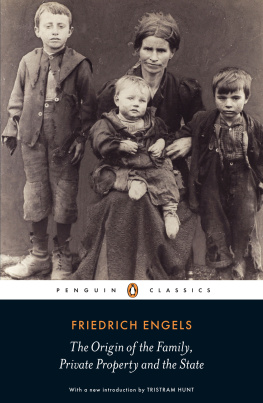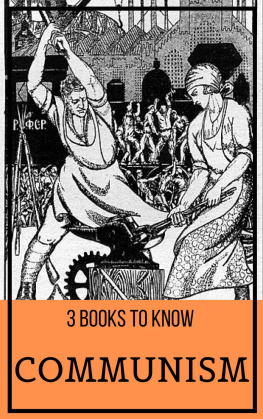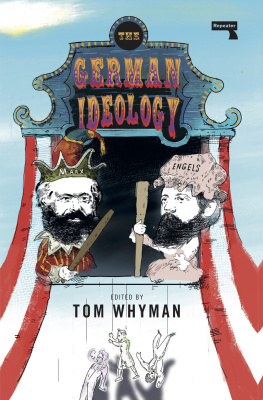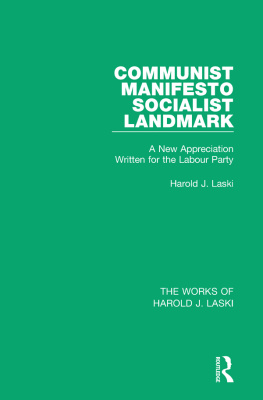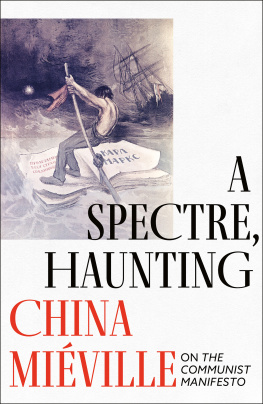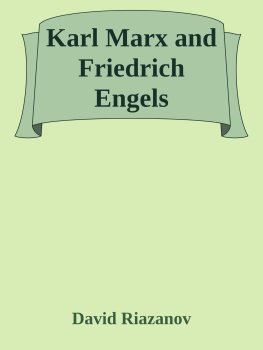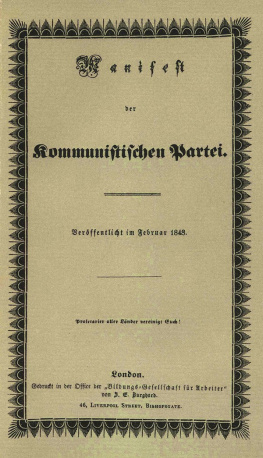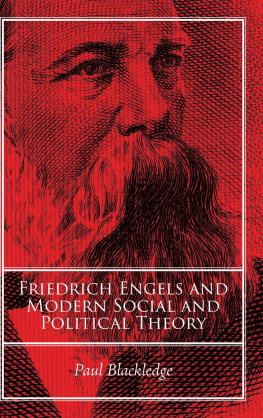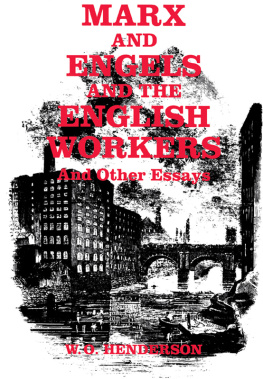Friedrich Engels - Manifesto of the Communist Party
Here you can read online Friedrich Engels - Manifesto of the Communist Party full text of the book (entire story) in english for free. Download pdf and epub, get meaning, cover and reviews about this ebook. year: 2010, genre: Politics. Description of the work, (preface) as well as reviews are available. Best literature library LitArk.com created for fans of good reading and offers a wide selection of genres:
Romance novel
Science fiction
Adventure
Detective
Science
History
Home and family
Prose
Art
Politics
Computer
Non-fiction
Religion
Business
Children
Humor
Choose a favorite category and find really read worthwhile books. Enjoy immersion in the world of imagination, feel the emotions of the characters or learn something new for yourself, make an fascinating discovery.
- Book:Manifesto of the Communist Party
- Author:
- Genre:
- Year:2010
- Rating:4 / 5
- Favourites:Add to favourites
- Your mark:
- 80
- 1
- 2
- 3
- 4
- 5
Manifesto of the Communist Party: summary, description and annotation
We offer to read an annotation, description, summary or preface (depends on what the author of the book "Manifesto of the Communist Party" wrote himself). If you haven't found the necessary information about the book — write in the comments, we will try to find it.
Manifesto of the Communist Party — read online for free the complete book (whole text) full work
Below is the text of the book, divided by pages. System saving the place of the last page read, allows you to conveniently read the book "Manifesto of the Communist Party" online for free, without having to search again every time where you left off. Put a bookmark, and you can go to the page where you finished reading at any time.
Font size:
Interval:
Bookmark:
The Project Gutenberg EBook of Manifesto of the Communist Party, by
Karl Marx and Frederick Engels
This eBook is for the use of anyone anywhere at no cost and with
almost no restrictions whatsoever. You may copy it, give it away or
re-use it under the terms of the Project Gutenberg License included
with this eBook or online at www.gutenberg.net
Title: Manifesto of the Communist Party
Author: Karl Marx
Frederick Engels
Editor: Frederick Engels
Release Date: February 5, 2010 [EBook #31193]
Language: English
*** START OF THIS PROJECT GUTENBERG EBOOK MANIFESTO OF THE COMMUNIST PARTY ***
Produced by Al Haines, from images obtained from The Internet Archive.
Party
KARL MARX
and
FREDERICK ENGELS
Published by the New York Labor News Co., 28 City Hall Place
1908
The "Manifesto" was published as the platform of the "Communist League," a workingmen's association, first exclusively German, later on international, and, under the political conditions of the Continent before 1848, unavoidably a secret society. At a Congress of the League, held in London in November, 1847, Marx and Engels were commissioned to prepare for publication a complete theoretical and practical party programme. Drawn up in German, in January, 1848, the manuscript was sent to the printer in London a few weeks before the French revolution of February 24. A French translation was brought out in Paris, shortly before the insurrection of June, 1848. The first English translation, by Miss Helen Macfarlane, appeared in George Julian Harney's "Red Republican," London, 1850. A Danish and a Polish edition had also been published.
The defeat of the Parisian insurrection of June, 1848the first great battle between Proletariat and Bourgeoisiedrove again into the background, for a time, the social and political aspirations of the European working class. Thenceforth, the struggle for supremacy was again, as it had been before the revolution of February, solely between the different sections of the propertied class; the working class was reduced to a fight for political elbow-room, and to the position of extreme wing of the Middle-class Radicals. Wherever independent proletarian movements continued to show signs of life, they were ruthlessly hunted down. Thus the Prussian police hunted out the Central Board of the Communist League, then located in Cologne. The members were arrested, and, after eighteen months' imprisonment, they were tried in October, 1852. This celebrated "Cologne Communist trial" lasted from October 4 till November 12; seven of the prisoners were sentenced to terms of imprisonment in a fortress, varying from three to six years. Immediately after the sentence the League was formally dissolved by the remaining members. As to the "Manifesto," it seemed thenceforth to be doomed to oblivion.
When the European working class had recovered sufficient strength for another attack on the ruling classes, the International Workingmen's Association sprang up. But this association, formed with the express aim of welding into one body the whole militant proletariat of Europe and America, could not at once proclaim the principles laid down in the "Manifesto." The International was bound to have a programme broad enough to be acceptable to the English Trades' Unions, to the followers of Proudhon in France, Belgium, Italy and Spain, and to the Lassalleans(a) in Germany. Marx, who drew up this programme to the satisfaction of all parties, entirely trusted to the intellectual development of the working class, which was sure to result from combined action and mutual discussion. The very events and vicissitudes of the struggle against Capital, the defeats even more than the victories, could not help bringing home to men's minds the insufficiency of their various favorite nostrums, and preparing the way for a more complete insight into the true conditions of working-class emancipation. And Marx was right. The International, on its breaking up in 1874, left the workers quite different men from what it had found them in 1864. Proudhonism in France, Lassalleanism in Germany, were dying out, and even the conservative English Trades' Unions, though most of them had long since severed their connection with the International, were gradually advancing towards that point at which, last year at Swansea, their President could say in their name, "Continental Socialism has lost its terrors for us." In fact, the principles of the "Manifesto" had made considerable headway among the workingmen of all countries.
The Manifesto itself thus came to the front again. The German text had been, since 1850, reprinted several times in Switzerland, England and America. In 1872 it was translated into English in New York, where the translation was published in "Woodhull and Claflin's Weekly." From this English version a French one was made in "Le Socialiste" of New York. Since then at least two more English translations, more or less mutilated, have been brought out in America, and one of them has been reprinted in England. The first Russian translation, made by Bakounine, was published at Herzen's "Kolokol" office in Geneva, about 1863; a second one, by the heroic Vera Zasulitch, also in Geneva, 1882. A new Danish edition is to be found in "Socialdemokratisk Bibliothek," Copenhagen, 1885; a fresh French translation in "Le Socialiste," Paris, 1886. From this latter a Spanish version was prepared and published in Madrid, 1886. The German reprints are not to be counted; there have been twelve altogether at the least. An Armenian translation, which was to be published in Constantinople some months ago, did not see the light, I am told, because the publisher was afraid of bringing out a book with the name of Marx on it, while the translator declined to call it his own production. Of further translations into other languages I have heard, but have not seen them. Thus the history of the Manifesto reflects, to a great extent, the history of the modern working class movement; at present it is undoubtedly the most widespread, the most international production of all Socialist Literature, the common platform acknowledged by millions of workingmen from Siberia to California.
Yet, when it was written, we could not have called it a Socialist Manifesto. By Socialists, in 1847, were understood, on the one hand, the adherents of the various Utopian systems: Owenites in England, Fourierists in France, both of them already reduced to the position of mere sects, and gradually dying out; on the other hand, the most multifarious social quacks, who, by all manners of tinkering, professed to redress, without any danger to capital and profit, all sorts of social grievances; in both cases men outside the working class movement and looking rather to the "educated" classes for support. Whatever portion of the working classes had become convinced of the insufficiency of mere political revolutions, and had proclaimed the necessity of a total social change, that portion, then, called itself Communist. It was a crude, rough-hewn, purely instinctive sort of Communism; still it touched the cardinal point and was powerful enough among the working class to produce the Utopian Communism, in France of Cabet, and in Germany of Weitling. Thus, Socialism was, in 1847, a middle class movement, Communism a working class movement. Socialism was, on the Continent at least, "respectable"; Communism was the very opposite. And as our notion, from the very beginning was, that "the emancipation of the working class must be the act of the working class itself," there could be no doubt as to which of the two names we must take. Moreover, we have ever since been far from repudiating it.
Font size:
Interval:
Bookmark:
Similar books «Manifesto of the Communist Party»
Look at similar books to Manifesto of the Communist Party. We have selected literature similar in name and meaning in the hope of providing readers with more options to find new, interesting, not yet read works.
Discussion, reviews of the book Manifesto of the Communist Party and just readers' own opinions. Leave your comments, write what you think about the work, its meaning or the main characters. Specify what exactly you liked and what you didn't like, and why you think so.


